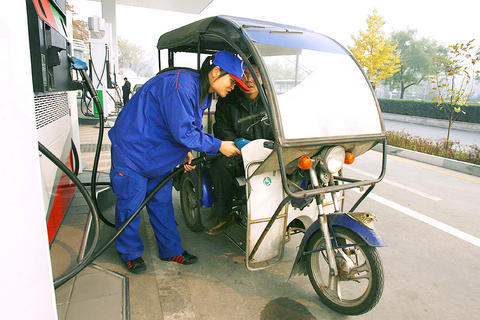Oil prices surged to a record high above US$98 a barrel in Asian trade yesterday and to within touching distance of the landmark US$100 level in a "crazy" market, dealers said.
The rise came after the US dollar hit a new low and amid expectations of more falls in US energy reserves, with both factors luring speculators to the fray, they said.
"It's a crazy market. People just want to get more money and are betting on the upside," said Tetsu Emori, an analyst with Astmax.

PHOTO: REUTERS
New York's main contract, light sweet crude for delivery next month hit a record trading high of US$98.03 before easing back to US$97.96. That was US$1.26 up from the closing record high of US$96.70 in the US on Tuesday.
Brent North Sea crude for delivery next month broke US$94 for the first time to a new high of US$94.54, up US$1.28 from Tuesday's finish.
"The dollar is falling very sharply this morning in Asia and commodities usually advance" when that happens, said Dariusz Kowalczyk, the chief investment strategist at CFC Seymour in Hong Kong.
The oil price trend was still upward and there was "nothing to change" that, Kowalczyk said.
A lower dollar makes oil more affordable for buyers in other currencies. The greenback has been sliding over growing speculation of another interest rate cut in the US, which is struggling with a credit crunch caused by a crisis over defaults on subprime loans extended to riskier homebuyers.
The euro soared to a fresh record high against the ailing dollar in Asian trade yesterday -- to as high as US$1.4665 at one point, dealers said.
Traders were also betting on a further decline in US crude reserves ahead of the northern hemisphere winter, when demand for heating fuel is expected to shoot up.
The US Department of Energy was to release yesterday its energy reserves report for the week ended Nov. 2. Crude supplies fell in the previous two weekly reports.
The consensus forecast is for US crude reserves to have fallen by 1.7 million barrels following recent disruptions to Mexican output.
"If the inventory figures are bad again then [New York crude] could push up," CMC Markets trader Nas Nijjar said. "It still feels as though there will be a test of the US$100 level ... We're not seeing any large sellers in this market."
The US Energy Information Administration said on Tuesday global oil supply would likely remain tight, supporting high prices.
It said that "global oil markets will likely remain stretched" because world oil demand has grown much faster than oil supply outside of OPEC. That had put pressure on OPEC and inventories to bridge the gap, it said, adding geopolitical risks, tight inventories in rich countries and worldwide refining bottlenecks were set to keep crude oil prices high and volatile.

MORE VISITORS: The Tourism Administration said that it is seeing positive prospects in its efforts to expand the tourism market in North America and Europe Taiwan has been ranked as the cheapest place in the world to travel to this year, based on a list recommended by NerdWallet. The San Francisco-based personal finance company said that Taiwan topped the list of 16 nations it chose for budget travelers because US tourists do not need visas and travelers can easily have a good meal for less than US$10. A bus ride in Taipei costs just under US$0.50, while subway rides start at US$0.60, the firm said, adding that public transportation in Taiwan is easy to navigate. The firm also called Taiwan a “food lover’s paradise,” citing inexpensive breakfast stalls

TRADE: A mandatory declaration of origin for manufactured goods bound for the US is to take effect on May 7 to block China from exploiting Taiwan’s trade channels All products manufactured in Taiwan and exported to the US must include a signed declaration of origin starting on May 7, the Bureau of Foreign Trade announced yesterday. US President Donald Trump on April 2 imposed a 32 percent tariff on imports from Taiwan, but one week later announced a 90-day pause on its implementation. However, a universal 10 percent tariff was immediately applied to most imports from around the world. On April 12, the Trump administration further exempted computers, smartphones and semiconductors from the new tariffs. In response, President William Lai’s (賴清德) administration has introduced a series of countermeasures to support affected

CROSS-STRAIT: The vast majority of Taiwanese support maintaining the ‘status quo,’ while concern is rising about Beijing’s influence operations More than eight out of 10 Taiwanese reject Beijing’s “one country, two systems” framework for cross-strait relations, according to a survey released by the Mainland Affairs Council (MAC) on Thursday. The MAC’s latest quarterly survey found that 84.4 percent of respondents opposed Beijing’s “one country, two systems” formula for handling cross-strait relations — a figure consistent with past polling. Over the past three years, opposition to the framework has remained high, ranging from a low of 83.6 percent in April 2023 to a peak of 89.6 percent in April last year. In the most recent poll, 82.5 percent also rejected China’s

PLUGGING HOLES: The amendments would bring the legislation in line with systems found in other countries such as Japan and the US, Legislator Chen Kuan-ting said Democratic Progressive Party (DPP) Legislator Chen Kuan-ting (陳冠廷) has proposed amending national security legislation amid a spate of espionage cases. Potential gaps in security vetting procedures for personnel with access to sensitive information prompted him to propose the amendments, which would introduce changes to Article 14 of the Classified National Security Information Protection Act (國家機密保護法), Chen said yesterday. The proposal, which aims to enhance interagency vetting procedures and reduce the risk of classified information leaks, would establish a comprehensive security clearance system in Taiwan, he said. The amendment would require character and loyalty checks for civil servants and intelligence personnel prior to